Trainer Robin Watson Practices “Gentle Training Culture” at His New British Gundogs Kennels in Florida

“No” is the favorite word of Englishman Robin Watson when it comes to teaching his British Labrador Retrievers their gamebird craft.
“I train a lot around the word ‘no’ because it’s like in the wild when animals growl at each other,” he explained.
Mr. Watson’s championship ways have earned him accolades and field trial trophies by employing the positive-reinforcement methods for training dogs in his native country over so-called compulsion training that relies on tools such as e-collars or choke-collar yanking. Instead, the dog is rewarded for positive performance while undesirable behavior is ignored.
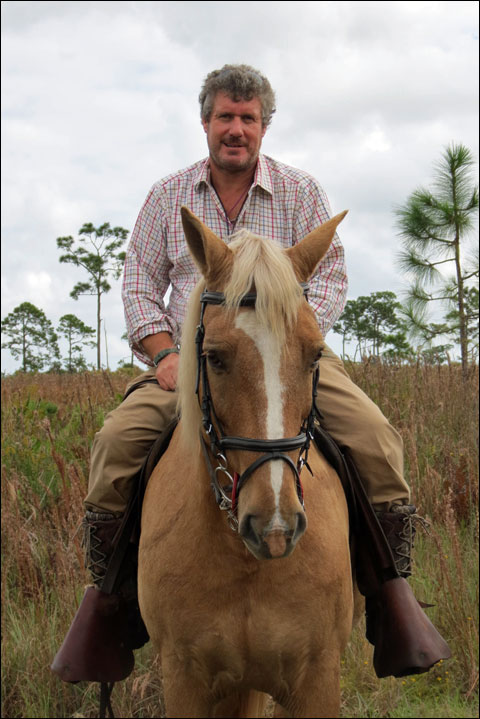
Robin Watson on the Florida planation that’s home to British Gundogs.
Now Mr. Watson can put his philosophy and methodology to the test of American wingshooting enthusiasts and field-trial participants with his recent move to a private plantation in Central Florida. The sprawling 7,000 acre property is owned by a family of businessmen – a clan of avid quail hunters who have been breeding Tennessee Walking Horses and bird dogs for decades and British Labradors for some 15 years. Since the late 1990s, Mr. Watson had been visiting the U.S. to conduct dog-training seminars. During one of those visits, he sold a British Labrador, employed for flushing and retrieving, to one of the family members, marking the start of a professional relationship that ultimately led to permanent residence.
“The owners of the ranch wanted to go in a different direction with their dog-training and habitat programs,” he said. “In March of 2015, they asked me to work full time on their ranch to train the dogs and manage the land.”
As a trainer and breeder of British Labradors, the owners launched a business that is run by Mr. Watson called British Gundogs. And they are off to a solid start with the company’s recent inclusion in both the Orvis Endorsed breeder and trainer programs. Their first generation British Labradors are bred to English field trial champions from imported semen. Mr. Watson describes them as blood lines that are the very best in the U.S. to satisfy the highest standards of the owners’ discriminating passion for these gun dogs. Finished gundogs at the plantation are expected to retrieve thousands of birds to hand each season at the plantation, while still remaining calm and quiet on the hunt wagon.
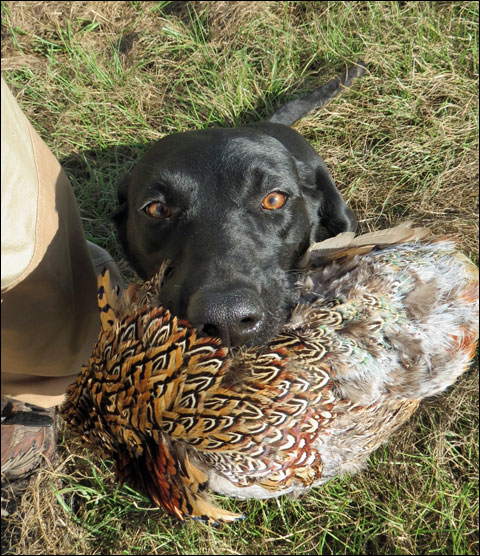
One of the British Gundogs’ Black Labs on a successful retrieve.
Breeding is only part of Mr. Watson’s mission with the plantation’s owners. They also asked him to bring his British “Gentle Training Culture” style of training to the U.S. Favored by field trial dog owners in the United Kingdom, the Gentle Training Culture emphasizes positive training methods over punitive electronic collars. In the U.K., delivery to hand starts with breeding, where proprietary genetics promotes the desired behavior that best responds to positive reinforcement. In essence, the handler rewards the dog’s innate nature to hunt and retrieve.
“To train a gun dog you don’t have to dominate it,” he said. “You’re part of a team. We simply don’t believe in forced fetches, we don’t shock them.”
The best breed for this training regimen is the British Labrador – the dog that’s bred and trained by Mr. Watson. This breed is selected for its calm temperament, game-finding initiative, hunting persistence, receptivity to gentle training methods and predisposition to deliver to hand.
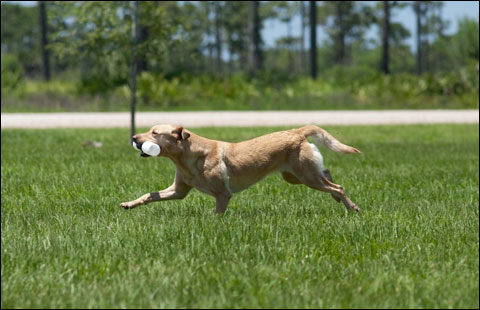
Watching a British Labrador Retriever at play helps Robin Watson determines its viability as a gun dog.
His vetting program relies in part on play, letting the dogs run free. “That gives us a chance to understand the dogs and see what we’re dealing with,” he said. “I actually start to make decisions on what to do with the dogs during their free exercise.”
Although Mr. Watson is relatively new to the U.S., his British Labradors have been quietly arriving in America since the 1990s as he continued to send 20 to 30 per year to American clients.
The success of his U.S. program was largely based on an impressive field-trial track record in the U.K. and Europe both independently and as a member of the England Gundog Team. He’s an “A Panel” Judge in the U.S. and one of only about 170 in the world. Mr. Watson was selected to judge the 2014 Skinner’s World Cup, the most prestigious retriever working test. As evidence of his life-long devotion to bettering the gundog world, he was made a Full Member of the Kennel Club, one of only a dozen or so such awards given to trainers from the “working” side of the dog community.
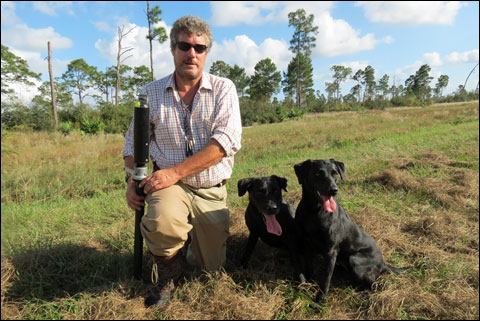
Robin Watson often uses a tennis-ball cannon to train his British Labrador Retrievers.
Tibea Gundogs, Mr. Watson’s kennel in England, was first established in 1964 by his late father, also named Robin Watson, and his mother, Marlene. When Mr. Watson’s father died in 1988 at age 44, he assumed control of the kennels when he was 21. Under the Tibea banner, he has produced such famous champions as FTCH Tibea Tosh, FTCH Brakenbird Minnow of Tibea, FTCH Whitmill Eclipse of Tibea and many others.
“I really wanted to do well in field trials with my father’s last dogs.”
Mr. Watson competed in field trials as an amateur handler until 1995 – competing with his own dogs and those owned by clients on 90 wooded acres devoted to training.
“I was always around gun dogs,” he said. “I got my first dog to train at 12.”
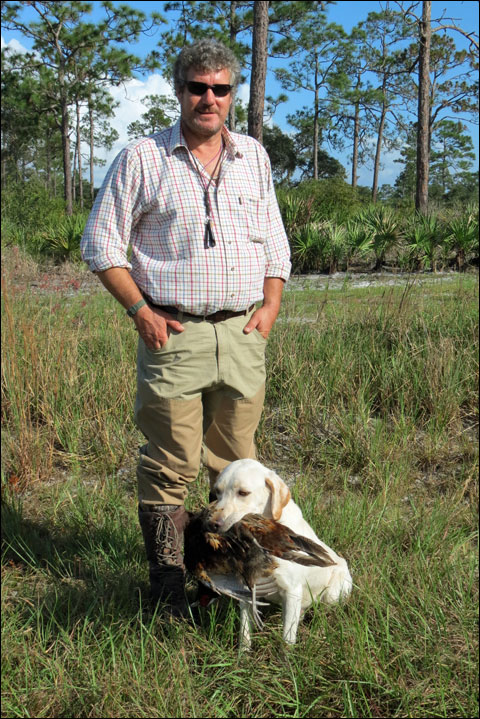
Robin Watson with Gus.
His training method centers on the retrieve. “I try to do everything with a dog around the retrieve.”
Patience is one of his secrets to training. “You need a lot of patience. A dog is always happy to see a patient trainer.”
British Gundogs currently has several dozen British Labradors. He also trains gun dogs already owned by some clients.
The kennel provides two lines of dogs. Their Champions Line comes from the finest field trial champion lines, while the Gundog Line is derived from very best working dogs on the plantation, Mr. Watson explained.
“Every time I sell a dog I want it to help sell five more,” he said. “I don’t want it to be my last one.”
Irwin Greenstein is the publisher of Shotgun Life. You can reach him at contact@shotgunlife.com.
Useful resources:

Irwin Greenstein is Publisher of Shotgun Life. Please send your comments to letters@shotgunlife.com.


Comments